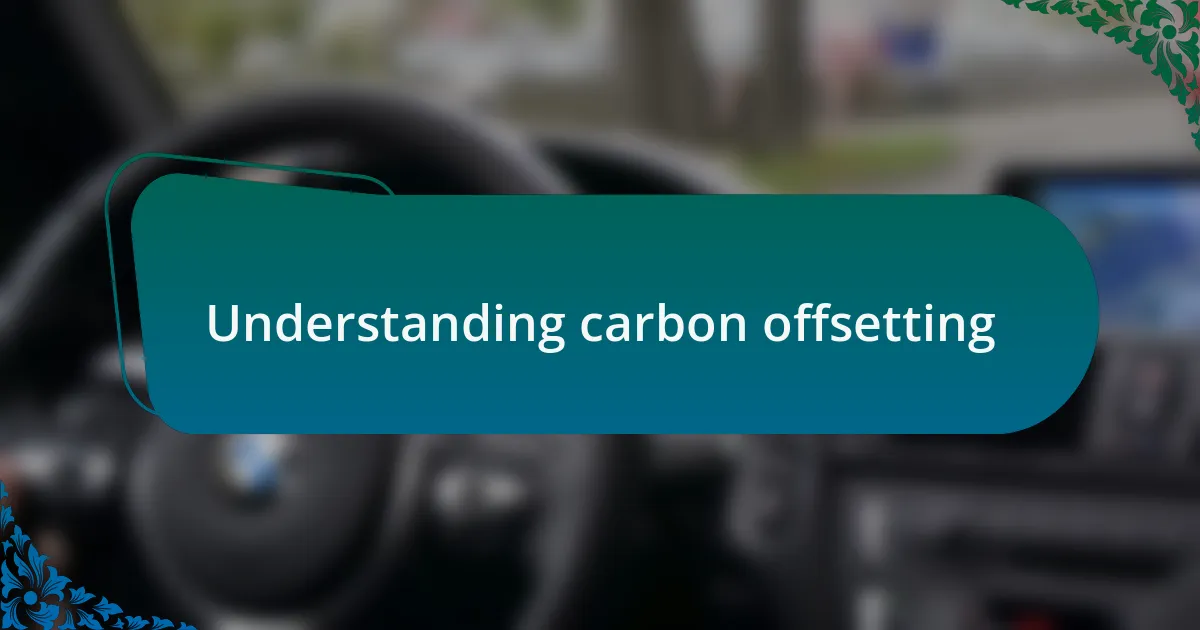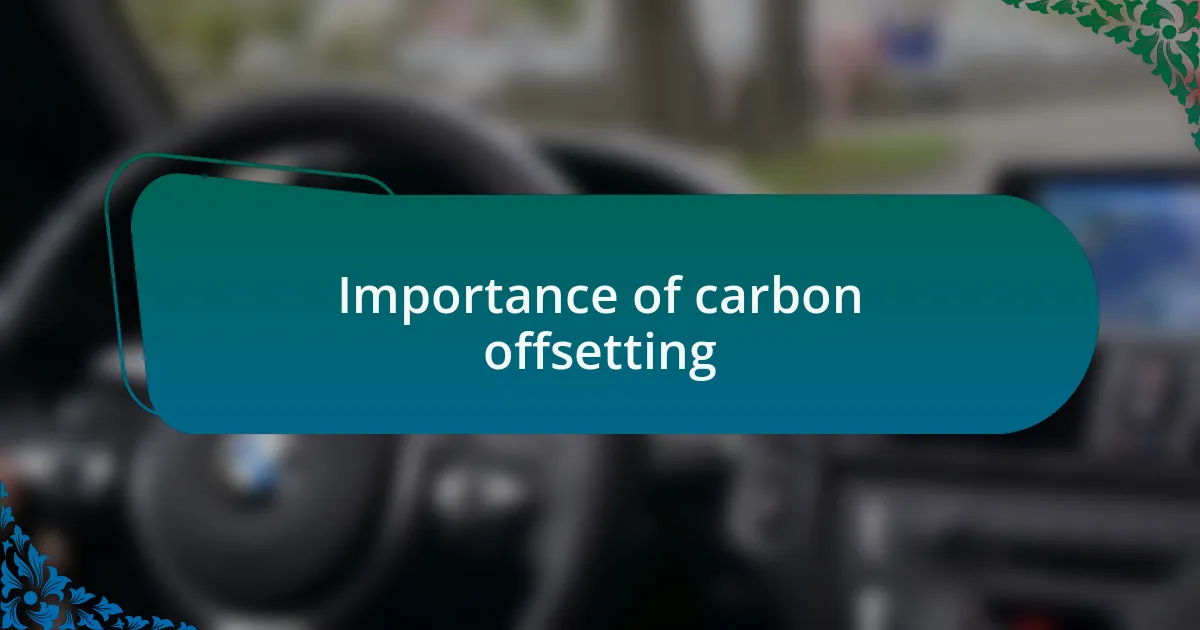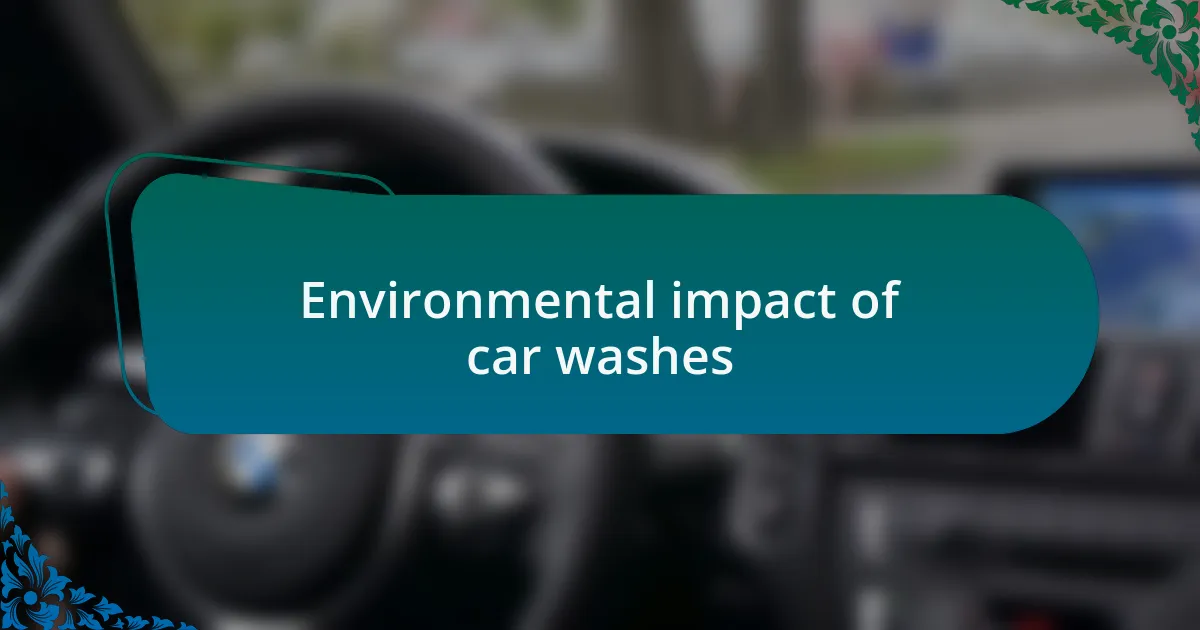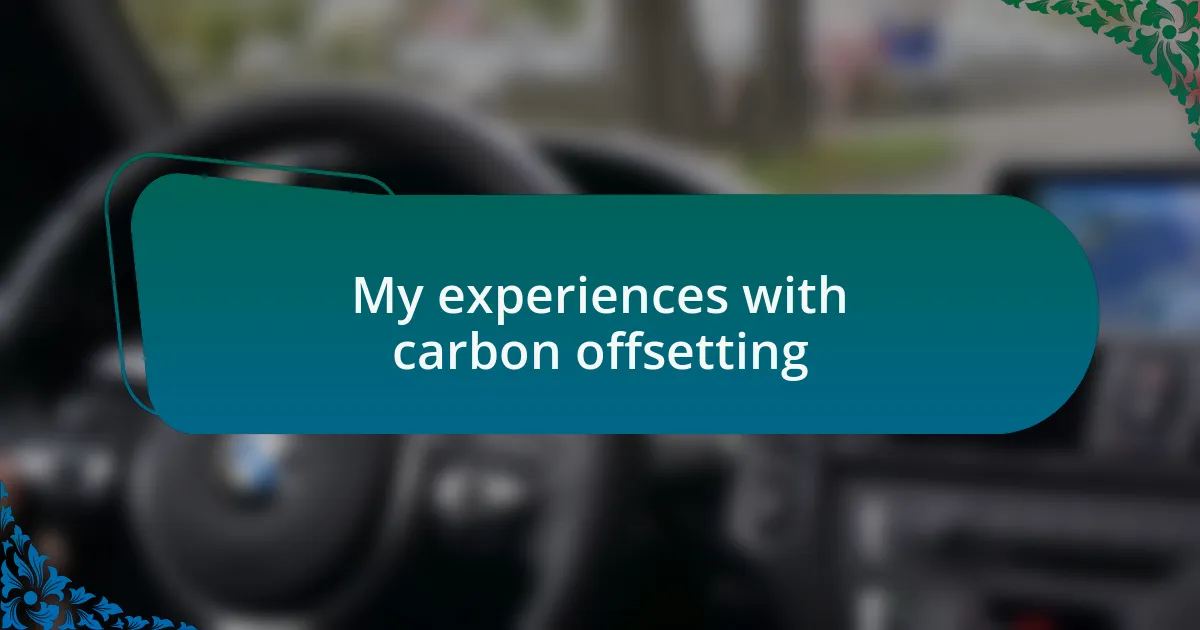Key takeaways:
- Carbon offsetting balances carbon emissions through investment in projects like reforestation and renewable energy, enhancing sustainability in the car wash industry.
- Customer engagement and transparency in carbon offset programs can improve business reputation and build loyalty.
- Adopting eco-friendly practices in car washes, such as water reclamation and using green cleaning products, is essential to minimize environmental impacts.
- Partnerships with reputable environmental organizations strengthen the credibility of carbon offset initiatives and ensure effective contributions to sustainability.

Understanding carbon offsetting
Carbon offsetting is essentially a way to balance out the carbon emissions produced by various activities. It involves investing in projects that reduce greenhouse gases, such as reforestation or renewable energy initiatives. Have you ever thought about how your car wash, while cleaning vehicles, contributes to carbon emissions? Understanding this connection can make us more conscious of how we can offset those impacts.
In my experience, small actions can add up to significant changes. When I learned about carbon offsetting, I realized that joining community efforts, like planting trees after a car wash event, could directly counterbalance the emissions from the business. It’s not just about the wash itself; it’s about creating a cleaner future for us all. Doesn’t that sound like a meaningful way to contribute?
Moreover, I find it fascinating that many car washes are adopting carbon offset programs as part of their sustainability initiatives. They often partner with organizations dedicated to preserving the environment, making it easier for customers to contribute to these efforts. How gratifying would it be to know that every time you wash your car, you’re participating in something greater—helping the planet thrive?

Importance of carbon offsetting
Offsetting carbon emissions is crucial as it helps mitigate the impact of our activities, including those that seem benign, like car washing. I remember the first time I really considered how all those suds can add to the carbon footprint. It struck me that taking responsibility for those emissions through offsetting isn’t just a nice idea; it’s a necessity that aligns our actions with our values about sustainability.
As I’ve observed within the car wash industry, embracing carbon offsetting can enhance a business’s reputation and foster customer loyalty. When a wash offers carbon offset programs, it tells customers, “We care about the planet just as much as we care about your car.” I can’t help but think about the pride I feel when I choose a service that aligns with my environmental ethics. Wouldn’t we all want to support businesses that contribute positively to the world?
Additionally, these offsetting initiatives often pave the way for innovative projects that benefit local communities. I recall participating in a tree-planting event organized by a local car wash, and it opened my eyes to how interconnected our efforts can be. By engaging in these programs, we’re not just counterbalancing emissions; we’re investing in a healthier environment for future generations. Isn’t that a legacy worth building?

Overview of car wash industry
The car wash industry has evolved significantly over the past few decades, transforming from a simple service into a multifaceted sector. When I think back to my childhood, car washes were just a quick way to get a clean vehicle, but now they often incorporate eco-friendly practices and technology. The growth of automatic washes and water reclamation systems demonstrates how businesses are adapting to changing consumer preferences and environmental concerns.
In recent years, we’ve seen an increasing emphasis on sustainability, as car washes seek ways to differentiate themselves in a competitive market. I remember visiting a local wash that proudly displayed its eco-certification, making me feel more confident in my choice. It’s interesting how businesses are leveraging their green initiatives not only for marketing but also as a genuine commitment to the environment.
Moreover, the industry’s growth is mirrored in the rise of mobile car wash services, which cater to convenience while often implementing more sustainable practices. This shift has allowed car washes to meet customers where they are, and I have to admit that I love the idea of a clean car without having to leave my driveway. It makes me wonder how these innovative models will evolve further, possibly integrating more comprehensive approaches to carbon offsetting. What does the future hold for such dynamic services?

Environmental impact of car washes
When I think about the environmental impact of car washes, I can’t help but reflect on the water usage involved. Traditional methods often waste significant amounts of water, which can be especially concerning in drought-prone areas. I remember a particularly hot summer where seeing sprayers blasting water felt almost wasteful; it made me realize how vital it is to adopt more responsible practices.
It’s also essential to consider the chemicals used in the washing process. I’ve been to car washes that tout their “green” cleaning products, yet I still wonder how green they really are. Some harsh chemicals can not only harm local ecosystems but also contribute to water pollution. When I think about how these substances can seep into groundwater, it gives me pause every time I choose a wash.
Then, there’s the energy consumption associated with car washes. It’s fascinating and a bit unsettling to think about how much energy these facilities require to operate their machinery and keep the lights on. I often wonder if solar panels or other renewable energy sources could be the answer, ultimately reducing the carbon footprint and making these services more sustainable. Have you noticed any local car washes that are taking steps in this direction? Seeing that commitment can certainly influence my choice.

My experiences with carbon offsetting
I’ve had some eye-opening experiences with carbon offsetting in car washes that have really shaped my perspective. I remember visiting a local wash that proudly advertised its carbon offset program. At first, I was skeptical—could simply paying a bit extra truly make a difference? But learning about their investments in tree planting and renewable energy made me feel like I was participating in something larger than just getting my car cleaned.
On another occasion, I decided to try a car wash that claimed to offset its emissions by supporting local environmental initiatives. As I waited, I chatted with the owner about how he chose specific projects to fund. It struck me how passionate he was about making a genuine impact. Seeing that level of commitment not only reassured me about my choice but also made me reflect on how little actions can lead to significant changes when we connect with the right causes.
However, I still grapple with the idea of measuring impact. How can we be sure that the offsets we invest in are substantial and effective? I often catch myself questioning whether my contributions are truly addressing the environmental issues at stake. It’s a delicate balance between feeling good about making a sustainable choice and wanting to ensure that my efforts lead to real results in the fight against climate change.

Recommendations for effective practices
When considering effective practices for carbon offsetting in car washes, it’s crucial to prioritize transparency. I once visited a wash that openly displayed details about its carbon offset projects, which made me feel more confident in my choice. If a car wash shares clear information on where the funds go and the expected outcomes, it adds a layer of trust that makes participating in a program feel more meaningful.
Engaging with customers about their carbon footprint can enhance awareness and drive more sustainable choices. I remember how a friendly staff member explained the specific benefits of their eco-friendly products while I was waiting. It wasn’t just a sales pitch; it felt like a genuine conversation about our collective environmental impact. Have you ever noticed how a little education can inspire you to contribute more?
Lastly, partnering with reputable organizations can amplify the effectiveness of any carbon offset initiative. I once learned that a car wash collaborated with a well-known environmental charity focused on local reforestation efforts. Seeing that partnership made me believe in the initiative more. It’s vital for businesses to choose partners who have a proven record of making a difference; this not only enhances their credibility but also reassures customers like me who want tangible outcomes from their contributions.